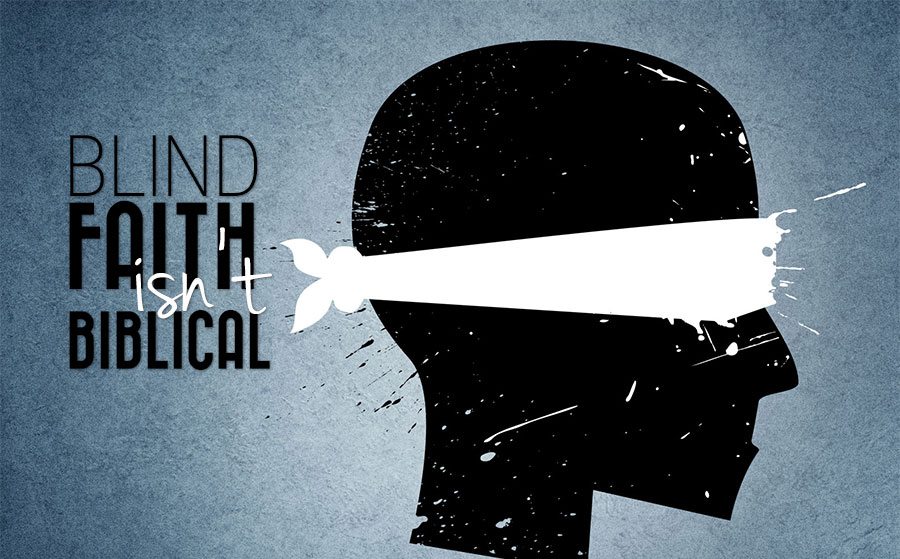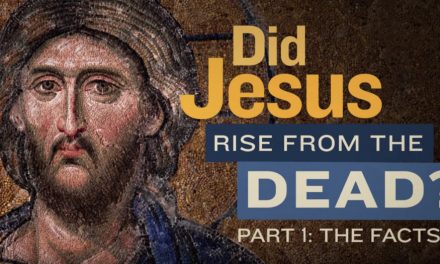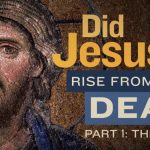By Tim Barnett
“If we had evidence, we wouldn’t need faith!”
One of the liabilities of language is that words can change their meaning over time. Consider the word awful. A century ago it literally meant “to be full of awe.”[1] Testifying to an awful sunset would have been communicating reverence for the event. However, today the word is almost exclusively used to articulate something as extremely unpleasant or distasteful.[2] Ironically, the term awful has come to mean the opposite of what it used to mean. Therefore, given the mutability of words, it is very important to take the time to clarify terms.
The word faith is also a word that has come to mean something completely different than it did a few millennia ago. In fact, it is rare to hear the word faith being used as the biblical author intended it. As a result, there is a common misunderstanding about faith that is being propagated both inside and outside the church. In his influential book Love Your God with All Your Mind, Christian philosopher J. P. Moreland writes, “Faith is now understood as a blind act of will, a decision to believe something that is either independent of reason or that is a simple choice to believe while ignoring the paltry lack of evidence for what is believed.”[3]
Is faith really a blind leap into the darkness of irrationality? American author Samuel Clemens thought so. Writing under the pseudonym Mark Twain, he succinctly wrote, “Faith is believing something that you know ain’t so.”[4] According to Twain, if you know it, then you do not need faith. Faith is for people who want to believe something in spite of the evidence against it.
In the twenty-first century, there is a cadre of atheists propagating this false belief.[5] Neuroscientist and atheist, Sam Harris, echoes this idea in his book The End of Faith. He says,
Tell a devout Christian that his wife is cheating on him, or that frozen yogurt can make a man invisible, and he is likely to require as much evidence as anyone else, and to be persuaded only to the extent that you give it. Tell him that the book he keeps by his bed was written by an invisible deity who will punish him with fire for eternity if he fails to accept its every incredible claim about the universe, and he seems to require no evidence whatsoever.[6] [Emphasis added.]
Harris takes faith to be any belief that is not buttressed by supporting evidence. So belief in fairies, unicorns, and Santa Claus would all fall into this category. The evidence is simply lacking.
Leading New Atheist Richard Dawkins goes one step further. In his bestselling book The God Delusion, he defines faith as “persistent false belief held in the face of strong contradictory evidence.”[7] Not only is faith a belief with no evidence, but also it is in spite of the evidence. As a result of this incorrect concept of faith, Dawkins concludes that faith is one of the world’s greatest evils:
It is fashionable to wax apocalyptic about the threat to humanity posed by the AIDS virus, …“mad cow” disease, and many others, but I think a case can be made that faith is one of the world’s great evils, comparable to the smallpox virus but harder to eradicate. Faith, being belief that isn’t based on evidence, is the principal vice of any religion.[8] [Emphasis added.]
The New Atheists are touted as being beacons of reason and evidence. In fact, in Dawkins’s book A Devil’s Chaplain, he offers some helpful advice to his readers. He writes, “And next time somebody tells you that something is true, why not say to them: ‘What kind of evidence is there for that?’ And if they can’t give you a good answer, I hope you’ll think very carefully before you believe a word they say.”[9] It would be fair to ask, what kind of evidence is there for this prevalent definition of faith? Instead of arguing for their definition of faith, they simply assume it. Ironically, it is the New Atheists who just assert their definition of faith without any evidence. They condemn blind faith, and then expect people to accept their definition on blind faith. But is this really what the biblical authors had in mind when they described faith?
A Biblical Definition of Faith
If one wants to properly understand the biblical concept of faith, they must consult the Bible itself. Unfortunately, many of those who criticize Christian faith have never bothered to open the Bible to see what it teaches. If they had, they would have come to a completely different conclusion. Moreland says, “Biblically, faith is a power or skill to act in accordance with the nature of the kingdom of God, a trust in what we have reason to believe is true. Understood in this way, we see that faith is built on reason. We should have good reasons for thinking that Christianity is true before we dedicate ourselves completely to it.”[10] (Emphasis in original.)
John Lennox, Oxford mathematician and author of God’s Undertaker, emphatically states, “Faith is a response to evidence, not a rejoicing in the absence of it.”[11] Moreland and Lennox affirm that faith and reason are complementary, not contradictory. This is in stark contrast to the description of faith above. To determine which is correct, consider just two scriptural examples of faith.
In the Gospel of Mark, the author records how a group of friends brought a paralyzed man to see Jesus. Unfortunately, the house was too full and they could not get in. Determined to get their physically handicapped friend to Jesus, they lifted him onto the roof, dug a hole, and lowered him down. Jesus’ response is very informative:
And when Jesus saw their faith, he said to the paralytic, “Son, your sins are forgiven.” Now some of the scribes were sitting there, questioning in their hearts, “Why does this man speak like that? He is blaspheming! Who can forgive sins but God alone?” And immediately Jesus, perceiving in his spirit that they thus questioned within themselves, said to them, “Why do you question these things in your hearts? Which is easier, to say to the paralytic, ‘Your sins are forgiven,’ or to say, ‘Rise, take up your bed and walk’? But that you may know that the Son of Man has authority on earth to forgive sins”—he said to the paralytic—“I say to you, rise, pick up your bed, and go home” (Mk. 2:5-11).[12]
Jesus recognizes that anyone could claim to forgive sins since this is an invisible act that cannot be directly verified. Jesus could have merely told His audience to take a leap of faith and just believe. Instead, Jesus provides His listeners with evidence so that they will know He has the authority to forgive sins. He provides physical evidence, a visible healing, to back up His claim, the invisible act of forgiving sins.
The most important verse in the Bible defining faith is found in the book of Hebrews. In chapter 11, the author of Hebrews writes, “Now faith is the assurance of things hoped for, the conviction of things not seen” (Heb. 11:1; emphasis added). Some people immediately focus in on the terms “hoped for” and “not seen,” and incorrectly conclude that faith is hoped for and not seen. However, that is not what the verse says.
Faith is the assurance and conviction of things hoped for. Assurance entails solid reasons to believe something. One only has assurance when they have a sufficient amount of evidence. In fact, The New King James Version substitutes the word conviction with evidence.[13] Therefore, Christians should have confidence in things hoped for and things unseen, like their future resurrection, because of the trustworthy evidence that has already been established.
Many more scriptural passages could be added to the list. However, this should be sufficient in demonstrating that the biblical writers saw an important relationship between faith and reason. In light of the evidence, New Atheists, like physicist Victor Stenger, have no excuse for propagating the false idea that “faith…is belief without supportive evidence.”[14] A short examination of the biblical data confirms that faith is evidence-based.
Here’s how I explain faith to students. Imagine you are standing at the edge of Niagara Falls. While you are watching this magnificent waterfall, you notice there is a tightrope walker walking from one side to the other, pushing a wheelbarrow full of rocks. You are mesmerized by his amazing ability, so you keep watching him do it over and over again.
The tightrope walker sees that you have been watching for some time and walks towards you. He asks, “Do you believe that I can do it again?” Given that you have seen him do it numerous times already, you reply, “Of course, I’ve seen you doing it all day.” Without hesitation, he dumps out all the rocks and replies, “Okay, climb in the wheelbarrow.” You believe based on evidence. And stepping into the wheelbarrow is active trust. Therefore, biblical faith is active trust based on evidence.
So, are faith and reason in conflict? It depends entirely on how one defines faith. Faith as active trust based on evidence is certainly not at odds with reason. On this view, reason assesses whether or not something is true and then faith holds the belief is true in light of those reasons. Reason assesses; faith trusts. Greg Koukl says, “So let’s set the record straight. Faith is not the opposite of reason. The opposite of faith is unbelief. And reason is not the opposite of faith. The opposite of reason is irrationality. Do some Christians have irrational faith? Sure. Do some skeptics have unreasonable unbelief? You bet. It works both ways.”[15]
Certainly, there are Christians who have blind faith, but that does not mean that Christianity advocates blind faith. In fact, the concept of blind faith is completely foreign to the Bible. Given the widespread misunderstanding of the word faith, there are some Christians who are opting to use a substitute term. Instead of talking about faith, they use the word trust. Greg Koukl offers a suggestion to help clarify this confusion:
Stop using the word faith. Use the word trust instead, because biblical faith means active trust. And trust must be earned. Today, just as in Jesus’ day, we have “many convincing proofs” (Acts 1:3) that God is real and Jesus is the risen Savior—evidence enough to satisfy your mind and earn your trust.[16]
God is not interested in a blind leap of faith. He is looking for a step of trust. Biblical faith is not contrary to reason; it is consistent with reason.
______________________
[1] Merriam-Webster Online, s.v. “Awful,” (accessed April 7, 2014).
[2] Ibid.
[3] J. P. Moreland, Love Your God with All Your Mind: The Role of Reason in the Life of the Soul, 2nd ed. (Colorado Springs, CO: NavPress, 2012), 19.
[4] Mark Twain, “Pudd’nhead Wilson’s New Calendar,” Following the Equator, (1897), ch. 12.
[5] These atheists call themselves the “New Atheists.”
[6] Sam Harris, The End of Faith (New York: W. W. Norton, 2005), 19.
[7] Richard Dawkins, The God Delusion (2009; repr., Boston, MA: Houghton Mifflin Harcourt, 2011), 5.
[8] Richard Dawkins, “Is Science A Religion?” The Humanist 57, (January/February 1997): 26.
[9] Richard Dawkins, A Devil’s Chaplain: Reflections on Hope, Lies, Science, and Love (New York: Mariner Books, 2004), 248.
[10] J. P. Moreland, Love Your God with All Your Mind, 19.
[11] John Lennox, God’s Undertaker: Has Science Buried God? (Oxford, UK: Lion Hudson, 2009), 16.
[12] All Bible references are from the ESV unless otherwise noted.
[13] “Now faith is the substance of things hoped for, the evidence of things not seen” (Hebrews 11:1; NKJV).
[14] Victor J. Stenger, The New Atheism: Taking a Stand for Science and Reason (Amherst, NY: Prometheus, 2009), 15.
[15] Sean McDowell and Jonathan Morrow, Is God Just a Human Invention?, 30.
[powr-hit-counter id=97200e56_1479888182723]











